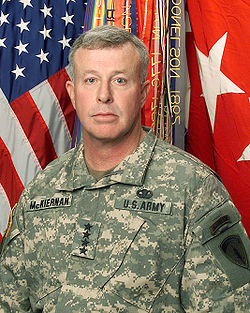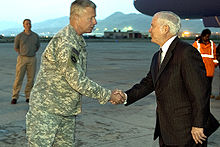- David D. McKiernan
-
David D. McKiernan 
General David McKiernanBorn December 11, 1950
Atlanta, GeorgiaAllegiance  United States of America
United States of AmericaService/branch  United States Army
United States ArmyYears of service 1972–2009 Rank  General
GeneralCommands held International Security Assistance Force
U.S. Forces Afghanistan
U.S. Army, Europe / Seventh U.S. Army
1st Cavalry Division
Third U.S. Army / CFLCCBattles/wars Gulf War
Iraq War
War in AfghanistanAwards Defense Distinguished Service Medal (2)
Army Distinguished Service Medal (3)
Defense Superior Service Medal
Legion of Merit (3)
Bronze Star
Defense Meritorious Service Medal
Meritorious Service Medal (4)
Army Commendation Medal (4)David D. McKiernan (born December 11, 1950)[1] is a retired United States Army four-star general who served in Afghanistan as Commander, International Security Assistance Force (ISAF) from June 3, 2008 to June 15, 2009.[2] He served concurrently as Commander, U.S. Forces Afghanistan (USFOR-A) from October 6, 2008 to June 15, 2009.[3]
Prior to Afghanistan, McKiernan was Commanding General, U.S. Army, Europe and Seventh U.S. Army from December 14, 2005 to May 2, 2008.[4] Before promotion to four-star rank, he served as Commanding General, Third U.S. Army and Coalition Forces Land Component Command (CFLCC) from 2002 to 2004, where he commanded all allied ground forces during the 2003 invasion of Iraq, and as Deputy Commanding General, U.S. Army Forces Command, the Army's largest major command, from 2004 to 2005.
On May 11, 2009, Defense Secretary Robert Gates asked for McKiernan's resignation from ISAF and USFOR-A. Gates said new leadership was needed as the administration of President Barack Obama launched a new strategy in the seven-year-old Afghanistan war. [5] McKiernan was replaced by two generals, General Stanley A. McChrystal (Commander) and Lieutenant General David Rodriguez (Deputy Commander), ISAF and USFOR-A.
Contents
Army career
McKiernan graduated from the College of William & Mary with a Bachelor of Arts degree in history in 1972. He was commissioned from the Reserve Officers' Training Corps and entered active duty as an Armor officer. He holds a Master of Public Administration degree from Shippensburg University and an honorary doctorate in public service from William & Mary.
His commands have included:
- 1st Battalion, 35th Armor (Iron Knights), 1st Armored Division, 1988–1990;
- 1st Brigade (Iron Horse), 1st Cavalry Division, 1993–1995;
- 1st Cavalry Division, 1999–2001;
- Third U.S. Army/Combined Forces Land Component Command, 2002–2004.
- Seventh U.S. Army/U.S. Army Europe, 2005–2008
- International Security Assistance Force (ISAF) and United States Forces-Afghanistan, 2008–2009
McKiernan gained experience in the Balkans as a staff officer in the 1990s. In July 1996, General McKiernan joined the Allied Command Europe Rapid Reaction Corps (ARRC), serving as the Deputy Chief of Staff G2/G3, forward deployed in both Sarajevo, Bosnia-Herzegovina and Rheindahlen (Mönchengladbach), Germany. From August 1998 until September 1999, he served as Deputy Chief of Staff, Operations, Headquarters, United States Army, Europe and Seventh Army during a period of simultaneous operations in Bosnia, Albania, and Kosovo.
Prior to these appointments he served in the VII Corps Headquarters during the First Gulf War (Liberation of Kuwait) and then as the G3 in the 1st Cavalry Division (approx 1992-3) in the rank of LTC. The first appointment was probably his first experience of working with other officers or formed units of other nationalities, in the second he had British Exchange Officers on his staff.
In 2001, he was assigned as G3 (Operations), Headquarters, Department of the Army. Following that posting, in September 2002, General McKiernan assumed command of the Third U.S. Army and U.S. Army Forces Central Command (ARCENT), and became the Coalition Forces Land Component Commander for U.S. Central Command in preparation for Operation Iraqi Freedom. In March 2003, General McKiernan led all coalition and U.S. conventional ground forces that attacked Iraq to remove Saddam Hussein from power.
Following his assignment as ground forces commander, McKiernan was assigned as Deputy Commanding General/Chief of Staff for United States Army Forces Command, the largest major command in the United States Army which is responsible for the readiness and deployment of Army forces based in the U.S. Then he assumed command of Seventh Army/U.S. Army Europe. He was then assigned to Afghanistan as Commander, International Security Assistance Force (ISAF) and United States forces-Afghanistan from June 3, 2008 to June 15, 2009.
Replacement and Retirement
United States Secretary of Defense Robert Gates met with McKiernan in Afghanistan on May 6, 2009. Gates announced McKiernan's replacement on May 11, 2009.[6][7] McKiernan's replacement was Lieutenant General Stanley A. McChrystal. The Washington Post called it a "rare decision to remove a wartime commander."
The Washington Post described the replacement as one of several replacements of Generals who represented the "traditional Army" with Generals "who have pressed for the use of counter-insurgency tactics."[6] The real reasons may be much more complicated, according to reports. The discussion to replace him started in March 2009, after a routine video conference with Adm. Mike Mullen, the chairman of the Joint Chief of Staff, and Defense Secretary Robert Gates. A battlefield update was followed by a series of questions on reconstruction and counternarcotics operations from Mullen and Gates, which Gen. McKierman was not well prepared to answer. This amplified the belief Gates and Mullen already had about McKiernan, that he is "too languid, too old-school and too removed from Washington", and lacked the "charisma and political savvy" that Gen. Petraeus had.[8] Adm. Mullen was unhappy with the answers for his questions during that meeting, and after discussions with Gates, Mullen traveled to Kabul the next month hoping that he could convince McKiernan to retire. He refused to resign, as he had not disobeyed any orders and believed that he was doing what the administration wanted. Two weeks later Gates relieved him of command although he was the primary architect who changed the strategy in Afghanistan by requesting 30,000 additional troops that was later endorsed by the administration and implemented by Gen. McChrystal (at an additional level of 21,000 troops). According to Washington Post, Gen. McKiernan spent only a year in Pentagon, most of the time he was deployed outside the U.S., he did not develop strong relationships with Afghan leaders, he did not "fawn" over lawmakers who visited him as Petraeus in Iraq, he was too differential to NATO, and he was perceived as more involved with battlefield in Afghanistan and not dealing with Washington enough at a time when Pentagon seems to expect top generals to be skilled diplomats also.[8]
McKiernan retired from the Army with full honors on July 15, 2009.[9] Secretary Gates praised him for his leadership at every military level and presented him with the Defense Distinguished Service Medal for his service.[9] He also received the Army Distinguished Service Medal from his retirement ceremony host, Army Chief of Staff, General George W. Casey, Jr.[9]
Iraq War Troop Levels Debate
In their book, Cobra II, military historians Michael Gordon and Bernard E. Trainor suggest that McKiernan was unhappy to hear of the cancellation of the deployment of the 1st Cavalry Division, a 17,000-soldier force that was scheduled to arrive in Iraq as a follow-on reinforcement. Its deployment was cancelled on April 21, 2003 after U.S. Defense Secretary Donald Rumsfeld raised the issue of whether it was needed. Previously, shortly before the war, McKiernen won Pentagon approval for a new war plan that increased the number of ground troops, calling the new war plan COBRA II. During Operation Iraqi Freedom, he had a different view of the battlefield than his superior, General Tommy Franks.[10] McKiernan saw the Saddam Fedayeen fighters as a major threat and one of the "centers of gravity" in Iraq, while Franks dismissed the importance of the irregulars.[10] The military was also surprised when McKiernan and his staff were not given command for post-war operations in Iraq, which instead went to V Corps and the newly-promoted Lt. General Ricardo Sanchez.[10]
Targeted killing
In a 2008 interview by Der Spiegel, McKiernan, was asked whether Germany was a particularly difficult ally because its government requested limitations on its soldiers' deployment in Afghanistan, feeling that it might violate Germany's constitution if they were to conduct a targeted killing, in the absence of a direct attack.[11] McKiernan responded:
If ... the decision has been a legal and political decision back in Germany ... I accept that. But as a soldier, I don't understand it. I don't understand ever putting your men and women in harm's way, without their having the full ability to protect themselves. That also means operating on actionable intelligence to defeat insurgents, and protect your forces. That's how you keep your soldiers alive.[11]
Awards and decorations
McKiernan awards and decorations include, but are not limited to:
Defense Distinguished Service Medal (with oak leaf cluster) Army Distinguished Service Medal (with two oak leaf clusters) 
Defense Superior Service Medal Legion of Merit (with two oak leaf clusters) 
Bronze Star 
Defense Meritorious Service Medal Meritorious Service Medal (with three oak leaf clusters) Army Commendation Medal (with three oak leaf clusters) Army Achievement Medal (with three oak leaf clusters) 
Parachutist Badge (United States) 
Ranger Tab References
- ^ [1]
- ^ "McKiernan Assumes Command of NATO Forces in Afghanistan". American Forces Press Service. June 3, 2008. http://www.army.mil/-news/2008/06/03/9617-mckiernan-assumes-command-of-nato-forces-in-afghanistan.
- ^ "Press Conference with Secretary Gates and Adm. Mullen on Leadership Changes in Afghanistan From the Pentagon". DefenseLink News Transcript. May 11, 2009. http://www.defenselink.mil/transcripts/transcript.aspx?transcriptid=4424.
- ^ Dave Melancon , U.S. Army Europe Public Affairs Office (May 9, 2008). "McKiernan says farewell to U.S. Army Europe as he heads to Afghanistan to command international force". Army.mil. http://www.army.mil/-news/2008/05/09/9065-mckiernan-says-farewell-to-us-army-europe-as-he-heads-to-afghanistan-to-command-international-force/. Retrieved October 22, 2010.
- ^ "US replaces general in Afghanistan as war worsens". Associate Press. May 11, 2009. http://news.yahoo.com/s/ap/20090511/ap_on_go_ca_st_pe/us_us_afghanistan_19.
- ^ a b Ann Scott Tyson (May 12, 2009). "Top U.S. Commander in Afghanistan Is Fired". Washington Post. Archived from the original on May 17, 2009. http://www.webcitation.org/query?url=http%3A%2F%2Fwww.washingtonpost.com%2Fwp-dyn%2Fcontent%2Farticle%2F2009%2F05%2F11%2FAR2009051101864.html&date=2009-05-17.
- ^ Yochi J. Dreazen, Peter Spiegel (May 12, 2009). "U.S. Fires Afghan War Chief: Four-Star General Replaced by Counterinsurgency Expert as Campaign Stumbles". The Wall Street Journal. Archived from the original on May 17, 2009. http://www.webcitation.org/query?url=http%3A%2F%2Fonline.wsj.com%2Farticle%2FSB124206036635107351.html&date=2009-05-17.
- ^ a b Rajiv Chandrasekaran (August 7, 2009). "Pentagon Worries Led to Command Change". Washington Post. http://www.washingtonpost.com/wp-dyn/content/article/2009/08/16/AR2009081602304.html.
- ^ a b c "Gates Praises McKiernan’s Leadership at Retirement Ceremony". Defenselink.mil. http://www.defenselink.mil/news/newsarticle.aspx?id=55135. Retrieved October 22, 2010.
- ^ a b c Gordon, Michael; Trainor, Bernard E. (March 13, 2006). "Dash to Baghdad Left Top U.S. Generals Divided". New York Times (New York City, New York). http://www.nytimes.com/2006/03/13/international/middleeast/13command.html. Retrieved October 2, 2008.
- ^ a b David McKiernan, interviewee (July 28, 2008). "Interview with NATO's Afghanistan Commander: 'A Counter-Insurgency Takes a Long Time, Longer than We Thought'". Der Spiegel. http://www.spiegel.de/international/world/0,1518,571345,00.html. Retrieved May 29, 2010.
External links
Military offices Preceded by
Paul T. MikolashekCommanding General of the Third United States Army
2002–2004Succeeded by
R. Steven WhitcombPreceded by
Burwell B. Bell IIICommanding General of U.S. Army Europe/Seventh United States Army
2005–2008Succeeded by
Gary D. SpeerPreceded by
Dan K. McNeillCommander, International Security Assistance Force (ISAF)
2008 -2009Succeeded by
Stanley A. McChrystalPreceded by
Karl EikenberryCommander, U.S. Forces Afghanistan1
2008 -2009Succeeded by
Stanley A. McChrystalNotes and references 1. CENTCOM biography (pdf), retrieved May 11, 2009 top
Categories:- Living people
- United States Army generals
- American military personnel of the War in Afghanistan (2001–present)
- American military personnel of the Iraq War
- American military personnel of the Gulf War
- The College of William & Mary alumni
- Recipients of the Distinguished Service Medal (United States)
- Recipients of the Legion of Merit
- Recipients of the Bronze Star Medal
- Grand Crosses with Star and Sash of the Order of Merit of the Federal Republic of Germany
- Shippensburg University of Pennsylvania alumni
- 1950 births
Wikimedia Foundation. 2010.

